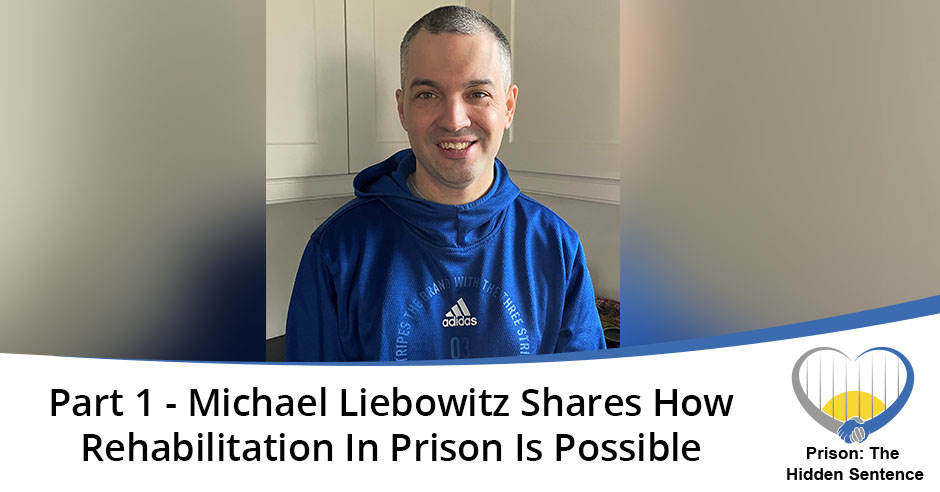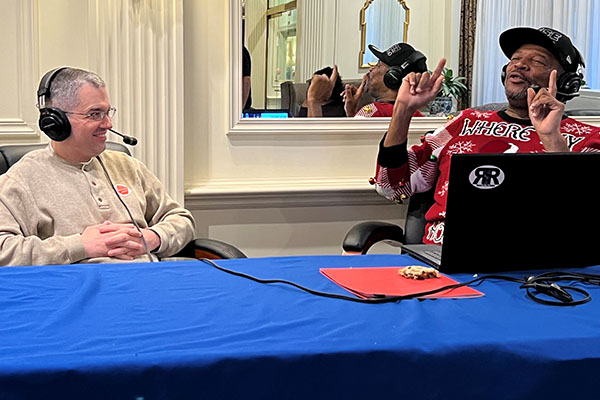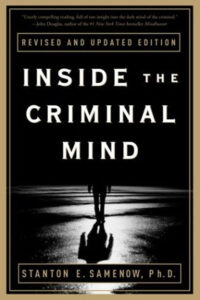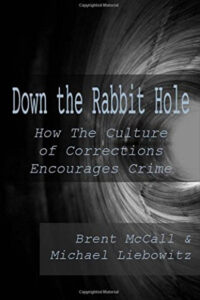
Michael Liebowitz shares his story about his rehabilitation in prison, his desire to change, and his epiphany of how he could change. He remembered a training course he took when he was younger and drew upon that experience. Hence, he started reading books on self-improvement to educate himself on becoming a better person. On his journey, he shared his stories on talk shows and mentored others in prison to help them become better men. He co-authored a book, “Down the Rabbit Hole: How the Culture of Corrections Encourages Crime.” Men like Michael give us all hope that rehabilitation is possible if a person is willing to do the work. Tune in to this inspiring episode and see how hope is never snuffed out for someone who has spent time behind bars.
—
Listen to the podcast here
Part 1 – Michael Liebowitz Shares How Rehabilitation In Prison Is Possible
Thank you for having me. I’m very excited about having this discussion.
As you said, I was an angry young man. I was angry at myself and at the world that was very entitled. I thought that I could do whatever I wanted and that nobody had a right to stand in my way. When I first entered the prison, I wouldn’t take responsibility for the fact that I was there. I blamed everybody else. I blamed my parents. I blamed the victims of my crime. I blamed the police. Anybody that I could find to point the finger at other than myself, I did.
It may be a defense mechanism or whatever it was, but I was not ready to say, “It’s me that has the issue.” I was insistent that it was the rest of the world. The problem is, that’s a very disempowering way to look at things because if everybody else is responsible, then there’s nothing I can do about it. I’m a victim of circumstance, and I suppose I always will be. When you view the world that way, there’s no reason to put forth any effort to change because your efforts will be fruitless. Instead, I lashed out at everybody that stood in my way.
It was horrible, especially because I was surrounded by hundreds of other people who felt the exact same way. That’s what us, angry people, criminals don’t tend to say that, “I’m the issue.” We look at everybody else and blame them. You’ve got an abundance of people all blaming the rest of the world for their problems. We feed off each other and tell each other how we’re all victims, but it also results in us becoming angry with each other because we’re angry people, and we tend to lash out at those around us.

It’s an interesting story, and to tell it, I have to backtrack a little bit too. When I was eighteen years old, I had an Oldsmobile. I was driving down the highway in the fast lane, and the engine seized. My two friends and I had to jump out of the car, stand on the side of the road, and hope that car didn’t get smashed into. It was a horrifying experience.
A few weeks later, I was driving my mother’s car, and there was a smell coming from the vents that reminded me of the smell that happens when the engine seizes. I thought the same thing was happening again. I panicked and pulled over. It turns out there was nothing wrong with the car. It was in my imagination. While I was standing on the side of the road, and I was eighteen years old, I had my tank top on.
I had on a backward mustache and tattoos showing. I had my Pitbull on a chain, and a guy pulled over and gave me a ride to go to the gas station. This guy introduced me to the Amway business. As a part of the Amway business, there was a reading system of self-improvement in how to be successful, about 70 books. I started to read and change. I then backslid and went into my old ways again, but when I was in prison one day, I was sitting down, and I thought to myself, “I want to change my life. How can I do it?” I remembered that teaching system.
I contacted the Amway guy and asked him if he would allow me to order books from him. He said yes. I started to read an abundance of self-improvement books, and that’s how I began to alter my thinking. What sparked that was the feeling of self-disgust in wanting something better out of life. I was tired of what was happening and wanted to do more, so I thought I’d read and change. I began the habit of reading probably 4 or 5 hours a day.
Whenever I would read a book within a book, inevitably, they cite other books. I would pick up books that I wanted to read, and then I would call my parents or call friends and ask them to order those books for me. I would go to the library, look for what they had, and maybe pick out something with a similar-sounding title. I kept going and going and then decided I wanted to get the college credits. I signed up for college and never lost my thirst for knowledge. I still haven’t lost it even now that I’m out, although my sources of information go beyond books with the new world. There are podcasts, online articles, and all types of things that I’ve been able to indulge in.
They have books, but I wouldn’t say the selection’s great. It’s not horrible, but you can’t just go there. If you hear of a book you want to read, the odds are that it’s not going to be there. As an example, whenever you tell a story like this, it’s not linear. I’m going to have to go back and forth a little bit. After I started reading and decided to change my life, I ended up backsliding quite a bit and started engaging in the behaviors I had been engaging in prior to my self-improvement.
I never, however, stopped reading during those times. I kept reading, and ultimately, it became an incongruent idea in my head between what I was reading and what I wanted to be and what I was. One of the greatest helps that I ever had was my friend Brent, the cellmate that you mentioned. He wasn’t my cellmate then, but he was my best friend. We decided at the same time to change, and he bought a book called Inside the Criminal Mind by Dr. Stanton Samenow. When in the book, we were very skeptical about somebody who thought they were going to explain to us what the criminal mind was all about.

We thought, “Who the heck’s this guy, and what does he know?” Reading that book was like discovering a veritable blueprint for our thinking. This guy described who we are better than we could have been, but he also described what it would take to change. From that moment with a map to what we had to do, we’ve never looked back either one of us. It certainly has not been an easy task to completely change who you are as a human being, all your habits, your entire personality, and your character. It’s very difficult.
We’re made up of a conglomeration of habits as human beings. If anybody ever wants to think about how difficult it is for a criminal to become a non-criminal, think that there are hundreds of habits that need to be changed. Think about how hard it is to change just one. When you have to change one bad habit, it’s a monumental task. Never mind when you have to restructure your entire identity.
We tried. It’s true. Not everybody has people that will send them books. To be fair, it’s also true that the majority of people that I’ve been in prison with weren’t very interested in reading. Carlos, who you had on your show, also was one person who absolutely devoured the literature that we provided him with. Even though he didn’t have a family to send him books, he found a way. He was willing to read everything. He was willing to discuss with us the various issues that we were all facing. That helped the three of us ultimately grow tremendously.
Before I answer that, I would like to address something you said. While I wholeheartedly agree that as individuals on this planet, we’re ultimately responsible for our own lives, nobody else is, and nobody can make us change. The problem I have is that people in authority are people that vote. They sometimes use that to go to the opposite extreme as an excuse to not help or to absolve people of responsibility from doing their jobs in corrections because they say, “It’s on the offender anyway.”
That’s true, but if you’re somebody’s loved one that person is in prison, you certainly can send them books or you can look up articles on the internet that have to do with criminal rehabilitation and send them to them. It’s still to the person to read them. You can’t make them read them. There are things that you can do, as there are things that society, in general, can do to help facilitate the process.
You’re welcome. I’m privileged to be able to provide that information. As an example, if somebody were to look up articles on evidence-based practices and corrections, you’d probably come up with an abundance of material from that one question of things that you could send to somebody. I highly recommend that anyone with loved ones in prison do so.
It’s people on the inside. First and foremost, I would say reading. It’s essential because by reading, you have your mind opened up to things you may never have considered. There’s not a person I’ve ever met, and these include very responsible people that weren’t partially blind to some of their own character defects or some of the things that they do that perhaps they shouldn’t.

When you read, you come up across many different ideas and ways of viewing things that it helps to expand your consciousness and aid you in applying that new information to a vast array of situation. Along with the reading, it’s vital. Prison is very dicey and difficult. You have to learn to associate with people that are doing productive things that have your best interest in mind.
Those kinds of people in prison are few and far between. I lucked out in finding Brent McCall, the co-author of the book, with me in my best friend whom I lived with for eleven years. People will frequently say to me, “You criticize the Department of Correction, Michael, but yet you were able to change.” If you’re counting on two guys meeting, becoming best friends, and holding each other accountable for a period of sixteen years, if that’s going to be your paradigm of change in prison, you’re barking up the wrong tree.
That’s essentially lightning in a bottle. That’s what happened with Carlos as well. While I recommend to people in prison to find positive people, associate with them and look for people that want your best interest and have your best interest in mind, I’m also very cognizant of the fact that it’s a difficult task that I’m suggesting people do.
First and foremost, self-honesty. I had to be willing to face things about myself that made me sick and upset that I didn’t want to face. Who wants to acknowledge, for instance, that they have low self-esteem and that their insecurities are what drove their violent conduct? “I wasn’t the tough guy that I pretended to be, but in reality, I was a coward.” Those are some of the things that I had to face, but you can’t change what you won’t acknowledge.
You can't change what you won't acknowledge. You have to be completely honest with yourself. Share on XYou have to be completely honest with yourself. In addition to that, you have to have something to change into. To say, “I don’t want to be this way,” isn’t enough. You also have to discover, “What is it that I want to be?” I decided I wanted to have a good work ethic. I wanted to be a responsible person. I wanted to be intelligent. I wanted to be logical, so I bought books on logic, how to think straight, how to reason from premise to conclusion, and how to weigh the evidence. By doing all those things, I set myself up so that when I came across the information, I knew how to weigh it. I knew what to accept and what not to accept. I hope that helps. It’s a very difficult process, and I’m trying to encapsulate it and put it into a few sentences. I’m sorry if it seems overly brief.
It’s a choice. You can’t force somebody to make it, but you can incentivize people to make it. If inmates understand that there’s a better world out there and a better life if they start making the right decisions, and if they continue to make bad decisions, they’re going to suffer for them, that helps to create the leverage to propel somebody into changing. I also would say that for people reading that are not in prison, but have loved ones in jail, if you want to help, you need to educate yourself. You need to learn about what works. You need to learn how criminals think so that you no longer accept excuses and you can hold your loved one accountable. I’ve heard people that have said it to me, “You have all those programs in jail that can help you.”
You have the programs in jail, but programs in jail and the environment in prison remind me a lot of the menu. We have things on the menu like Turkey a La King and chicken tetrazzini. Things that sound great, but when you see them, it’s vastly different than what the title suggests. The same is true with much incorrection. I wouldn’t be too prone to tell somebody in prison, “You have all these opportunities.” People should be aware that your loved one is responsible for their behavior but don’t put too much weight on what corrections are doing for them.
It’s like a pendulum almost, where you don’t want to go too far either way. You don’t want to provide too much leniency for the person and say, “None of it is your fault.” You also don’t want to say, “You have all these opportunities. Make the most of them.” As a loved one, there are things that you can do to help, but I wouldn’t put too much help. There is too much emphasis on what the department’s doing to help.
Brent McCall and I, initially, were not people that wanted to reform the prison system. We had read an abundance of books on self-improvement and how to change criminal thinking, and we thought that we had something to offer to other inmates. We designed a program called the Imprison Program. The prison program was focused on things like personal responsibility, value, self-esteem, and criminal thinking errors.
We got that program up and running at McDougall Correctional Institution for a little bit over four years. It was a confrontational group, and it was tough. We helped a lot of people, but ultimately, we kept running into the same line coming from the inmates, “What about the staff? The staff does this or that.” We would always tell them, “Whatever the staff does, your life is yours, and it’s your responsibility to change.”
Your life is yours, and it's your responsibility to change. Share on XI still believe that wholeheartedly. However, if you’re going to have a department and call it the Department of Correction, and you’re going to claim to be implementing evidence-based practices where you’re helping inmates to prepare for the world, then you have to be responsible also. It’s not just inmates that are responsible. Brent and I ultimately realized that having a program for rehabilitation is nearly impossible to work in an environment that pushes against rehabilitation at every step. That’s why we ended up writing Down the Rabbit Hole for the purpose of not only exposing what we thought was wrong with the prison system but also putting forth suggestions on what could be done to fix it.

For instance, there’s an abundance of evidence that Cognitive Behavioral Therapy addressed to criminogenic needs is what helps to reduce recidivism. Recidivism being inmates who get out of prison and end up going back. Those are the types of programs that should be implemented in prisons. They’re largely not, but the other part of that is those programs aren’t enough. They have to be implemented properly.
You can have the directions or the instructions on how to do it, but if the staff isn’t implementing it according to the instructions, then it’s useless. We identified that. Another thing is consistency with rule enforcement. In prison, it’s difficult to learn lessons because the rules are haphazardly enforced. Not only that, but sometimes, things that are enforced aren’t even rules. It all depends on what correctional officer happens to be working. Ultimately, you need to have a staff that consistently holds inmates responsible and accountable for their behavior, rewards good behavior, punishes bad behavior, and you need to have programming that works. It’s a simple enough formula, but implementing it is not so simple or not easy to do.
I’ve read that less than 10% of correctional facilities are equipped for rehabilitation. There’s something called criminogenic needs in the literature. It’s the fundamental concept when it comes to criminal rehabilitation. They interviewed 171 correctional practitioners. None of them could name three criminogenic needs. I put this to the test when I was in prison and asked the drug counsel, and he couldn’t name them.
How you’re going to rehabilitate offenders when you don’t even know what the modern advances are in rehabilitation? I don’t know. You asked a question about, “Are there prisons out there?” While I haven’t been to the prisons, I have read about them, and there’s a corporation called Serco, and they run private facilities, private prisons. I know a lot of people are going to bristle when they hear private prisons, but these private prisons aren’t run like those in America.
In America, the prisons are reimbursed based on the amount of people they house in them. The incentive is to keep people in prison, not to get them out, because the more people you have, the more money you’re going to get. Serco, a private company that operates in Australia, New Zealand, and the UK, reimburse their employees based on reductions in recidivism. The incentive structure is put in place so that they want to help inmates better themselves. They want to help inmates reform themselves so they can make it out in society. From what I understand, it works quite well. I haven’t done a lot of research on it, but I have read a little bit, and it seems to be promising in my view.
The first step is to educate yourself on what a criminal is, how they think, and what it takes to change. The information’s out there. As I said, if you google evidence-based practices and corrections or evidence-based practices and criminal rehabilitation or Stanton Samenow, if you look these things up and educate yourself on the subjects that I mentioned, everything else unfolds itself, and then you’ll know what to do.
It starts simply with a foundation, and from that, you’ll build upon it. You’ll know what articles to send, what books to send, or how to deal with your loved one. Keep in mind that nothing’s guaranteed. You can do everything in the world, but if the offender himself doesn’t want to change and won’t put forth the effort, then nothing’s going to help. Take it easy on the self-blame and take responsibility for somebody else’s actions. You can do what you can do, but that’s all you can do. Educate yourselves, look into these things and then let it go from there.
People who have been incarcerated must take it easy on self-blame and take responsibility for somebody else's actions. Focus on doing the things you can do. Share on XThank you, Julia.
Important Links
- Contact@PrisonTheHiddenSentence.com
- Down the Rabbit Hole: How The Culture of Corrections Encourages Crime
- Inside the Criminal Mind
- Carlos Rebollo – Past Episode
- Serco
- Prison: The Hidden Sentence
- https://www.Audacy.com/wtic/topic/michael-liebowitz
- https://DonPesci.Blogspot.com/2018/02/down-rabbit-hole-book-review.html
- https://PrisonFamiliesAlliance.org
About Michael Liebowitz
 During 25 years of incarceration, Michael Liebowitz read over 650 books, attained two associates degrees, completed two certificate programs, and coauthored “Down the Rabbit Hole: How the Culture of Corrections Encourages Crime “. He also became a regular guest on “The Todd Feinburg Show “, a popular radio show in Connecticut. Since being released in late November, he has been pursuing his goal to host a talk show.
During 25 years of incarceration, Michael Liebowitz read over 650 books, attained two associates degrees, completed two certificate programs, and coauthored “Down the Rabbit Hole: How the Culture of Corrections Encourages Crime “. He also became a regular guest on “The Todd Feinburg Show “, a popular radio show in Connecticut. Since being released in late November, he has been pursuing his goal to host a talk show.
Michael’s Top 10 Books:
- Inside the Criminal Mind , by Dr. Stanton E. Samenow
- The Criminal Personality,Vol.1, by Dr. Samuel Yochelson and Dr. Stanton E. Samemow
- The Criminal Personality, Vol.2, by Dr. Samuel Yochelson and Dr. Stanton Samemow
- Prisoners of Hate: The Cognitive Basis of Anger, Hostility, and Violence
- The Psychology of Self-esteem, by Dr. Nathaniel Branden
- The Psychology of Criminal Conduct, by James Bonta and D.A. Andrews
- As a Man Thinketh, by James Allen
- Atlas Shrugged, by Ayn Rand
- The Virtue of Selfishness, by Ayn Rand
- How to Think Straight, by Antony Flew
Love the show? Subscribe, rate, review, and share!
Join the Prison: The Hidden Sentence Community today:

George Dalton says
Dear Michael I commend you on your success with wise use of time and intelligence. I’ve listened to your keen analysis regarding existentialism, rehabilitation, bureaucratic inertia, systemic thinking with little regard to outright disdain toward independent thought. Compliments of Todd Feinberg and his objective to explain the failure of public policy in CT along with guests like yourself supporting the argument with facts and eloquence. I would enjoy exchanging ideas, feel free to contact me via email.